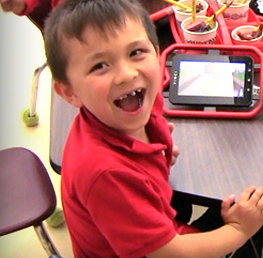VINCI Education taps the power of games to help students learn
 Young children are naturally curious, and one of the main ways they learn is through play. Yet, when they arrive at school, too often this sense of play is lost.
Young children are naturally curious, and one of the main ways they learn is through play. Yet, when they arrive at school, too often this sense of play is lost.
Aiming to recapture this sense of play and make learning more fun and engaging for students, a growing number of schools are turning to digital games to help teach core curriculum. That’s the thinking behind VINCI Education as well.
The company’s school-based solution, ClassVINCI, includes Android-based tablets designed specifically for young children, as well as animated learning games grounded in cognitive science; non-digital learning objects such as toys and books; a learning management system to track students’ progress and mastery of skills; and professional development for educators.
Using games for learning raises a number of key questions, such as: What does research say about gaming’s potential as an educational strategy? What best practices exist to help educators incorporate gaming into their classrooms successfully? How can schools ensure that games have real educational value, and are not just entertainment?
In an interview with eSchool News, early childhood education expert Sarah Cowan addressed these questions. She noted that, just because a learning solution is “fun,” doesn’t mean it’s not pedagogically sound or academically rigorous.
eSN: What was your role in helping to create the VINCI curriculum?
Sarah: I was hired to write the play guides. I have 17 years of teaching experience, including 11 years as an administrator. I work with an amazing, creative team of people; my role is to make sure the curriculum is educationally sound, developmentally appropriate, and meets the Common Core standards.
eSN: What was the thinking behind using games? How can these play a key role in the education of young children?
Sarah: The reality is, kids are exposed to technology at a very young age. Games are fun; kids love to play games, and we want to make them educationally appropriate. In a game-based environment, we can provide children with educational experiences in which they’re learning but don’t even realize it, because they’re having so much fun.
eSN: Can you describe some of these games in particular, and what skills children are learning as they play?
Sarah: In our lessons, we want to not only teach important concepts, but also explain why these are significant. We do this through more than 70 digital lessons spanning language arts, math, and science. The lessons we offer now are for children from age three to the end of first grade, but we’re developing curriculum that will cover up through third grade as well.
We firmly believe in a scaffolding approach: We start with a simple topic and grow knowledge from there. Our language-arts curriculum starts with letters and sounds and grows to phonemic awareness, words, and sentences. In math, we start with very simple concepts like colors and shapes and then proceed to counting, decomposing numbers, adding, and subtracting. Our science units are hands-on and cover topics such as plants, animals, the water cycle, and ecosystems.
For instance, in a game that teachers about the water cycle, children watch the process of condensation and evaporation on the screen. They see that clouds have to get to a certain consistency before it rains. Then, they are tasked with watering plants by making it rain; they have to drag enough water droplets into the clouds to make it rain.
eSN: What research did you draw on to make sure the games are not only engaging, but also pedagogically sound? How can educators be sure the curriculum “works” as an instructional tool, and not just as entertainment?
Sarah: We follow the Common Core standards, as well as early learning standards. Our games are based on constructive play theory. We also offer courses online for teachers to make sure they understand how to use the curriculum effectively.
In addition, our learning games are supported by a robust learning management system that operates in the background. While students are playing on their tablets, information is sent to our servers and analyzed, then sent back to the teacher so she can see how the children are doing.
Anything that can help teachers with gathering data is so important today. This takes the weight off teachers’ shoulders and helps them do their job more effectively.
- CIESC Member Schools Gain Access to Metrasens Ultra Weapons Detection Systems Through New Partnership - April 24, 2024
- SchoolStatus Launches SchoolStatus Boost, an Innovative Educator Development Solution for Enhanced Teacher Growth and Development - April 22, 2024
- Frontline Education Releases Inaugural K-12 Lens Survey Report To Guide K-12 Decision-Making - April 20, 2024

